Turkish Kurds Surrounded by War and Promises
For decades ordinary Kurds have struggled between an oppressive government and authoritarian guerrillas.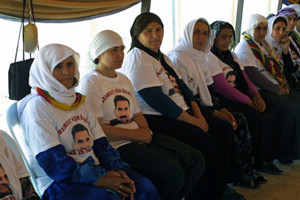
DIYARBAKIR, Turkey — A young man strums a long-necked Turkish lute called a saz while a friend quietly sings a lament for the Kurdish people. Here at the Tigris and Euphrates Culture Center, many young people sympathetic to the insurgent Kurdistan Workers Party (PKK) gather to drink coffee and perform music.
The center graduates some 300 aspiring musicians, actors, filmmakers and painters every six months. Some of them reportedly then join the PKK guerrillas in the mountains.
And that demonstrates the paradox facing the Turkish government. For 27 years, the Turkish military has tried to crush the guerrillas with a scorched-earth campaign against Kurds who have even the remotest connection to the PKK.
But the repression has only burnished the image of the guerrillas.
Kurds can’t even sing songs that mention the PKK or its leader, Abdullah Ocalan. So musicians have devised code words. Farqin, who uses only one name and is director of the center, sings about the beauty of a “rose garden” as a substitute for “Kurdistan.”
“Rose garden, we’re fighting for you,” he sings with a twinkle in his eye. But the PKK, which demands autonomy for the Kurdish region within Turkey, comes under criticism from some of the people it hopes to liberate. Leftists call it an authoritarian group that promotes a cult of personality around its supreme leader, Ocalan.
“If they come to power and continue being authoritarian, it could create problems,” said Faik Bulut, a Kurdish political commentator and author living in Istanbul.
Kurds make up about 18 percent of Turkey’s almost 79 million people and constitute the majority in the southeast section of the country.
The PKK has waged full-scale guerrilla war against Turkey since 1984. Turkey and the U.S. classifies the PKK as a terrorist group. The PKK argues that it is a national liberation organization that targets police and military, not civilians. Many civilians have been killed in PKK attacks, however. On Oct. 17, for example, a suspected PKK bomb blew up five police officers but also killed three civilians in eastern Turkey.
For its part, the army’s counterinsurgency campaign is responsible for the deaths of some 35,000 civilians and the forced relocation of 4,000 Kurdish villages.
The PKK has a chameleon-like history. In the 1980s, Ocalan called for an independent socialist Kurdistan. Now he rejects separatism and calls for “democratic autonomy” within Turkey’s capitalist system. In 1999, a Turkish court convicted Ocalan of treason, and he is now serving a life sentence in a Turkish island prison. Observers say Ocalan has opportunistically changed his politics as needed in order to win release.
PKK members and supporters worship Ocalan. Supporters keep his picture in their homes, chant his name at demonstrations and wear his image on T-shirts.
“He has the solution for every problem in society and in all societies everywhere,” PKK supporter Polat Bozan declared confidently.
The PKK has developed a significant base of support. The Kurdish Peace and Democracy Party (BDP) — a legal, electoral party with links to the PKK — and two smaller Kurdish parties won 38 seats in June’s national parliamentary elections. (Parliament has a total of 550 seats.)
In recent years, the PKK has faced a popular challenge from the Justice and Development Party (AKP), which is the ruling party in Ankara. In June, AKP’s candidates of Kurdish origin won 74 parliamentary seats.
Halit Advan, AKP chair in Diyarbakir, said his party has improved health services, provided subsidized housing and cash for parents.
Under AKP initiative, a state TV channel now broadcasts in Kurdish, universities have graduate level Kurdish language programs and the government began investigating human rights abuses against Kurds. Advan says that the military’s hostile policies against the Kurds are in the past.
But even moderate Kurds, who would have strongly applauded such changes 20 years ago, now expect more from the national government. On Sept. 17-18, a major conference in Diyarbakir, representing all pro-Kurdish political parties, discussed the basis for a possible peace settlement.
The conference focused on three key issues: primary and secondary schools should be allowed to teach in Kurdish; Kurds must have local political control of their region; and the new constitution now under consideration in Ankara must include rights for Kurds and other minorities.
If the Turkish government shows movement on those issues, Turkey could adopt a “South African solution,” according to commentator Bulut.
“If the state stopped military operations against the PKK, the PKK would not attack the Turkish state,” he said. “There would be a de facto cease-fire.”
If the cease-fire lasted, Ocalan could be moved from prison to house arrest, as happened with Nelson Mandela in South Africa. Then the two sides would negotiate a political settlement based on the three main demands. Amnesty for PKK fighters and their reintegration into civilian life could be discussed later.
Secret talks between the government and PKK have taken place. An audio recording was made public last month detailing a meeting between top PKK leaders and high-ranking members of Turkey’s intelligence service in the spring of 2010, the fifth such meeting. It was overseen by an unnamed third-country mediator. But there is no public record of talks since that time.
Although the outline of a peace settlement exists, neither side seems ready for a cease-fire. PKK raids in August killed a dozen Turkish soldiers. On Aug. 17, the Turkish military began bombing PKK guerrilla bases in the Qandil Mountains in neighboring Iraq. The military has threatened to launch a land incursion as well.
Bulut sees no quick end to the violence. “I don’t think a political solution will happen within a year,” he said. “At this stage, the military conflict will continue.”
Your support matters…Independent journalism is under threat and overshadowed by heavily funded mainstream media.
You can help level the playing field. Become a member.
Your tax-deductible contribution keeps us digging beneath the headlines to give you thought-provoking, investigative reporting and analysis that unearths what's really happening- without compromise.
Give today to support our courageous, independent journalists.

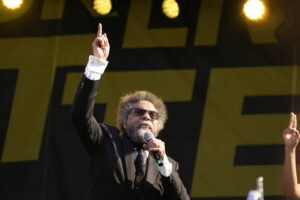
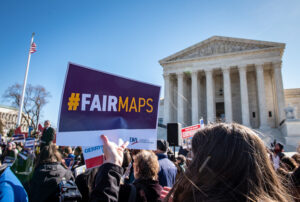
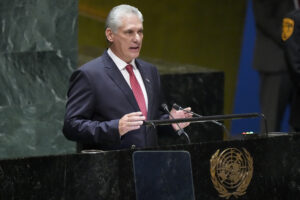
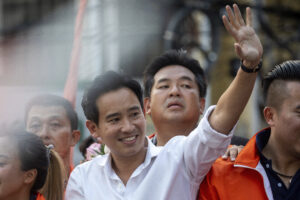
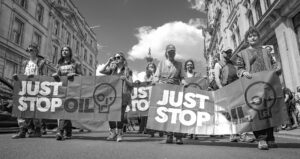
You need to be a supporter to comment.
There are currently no responses to this article.
Be the first to respond.